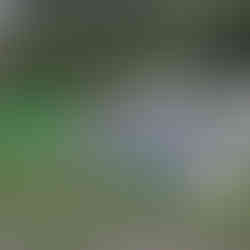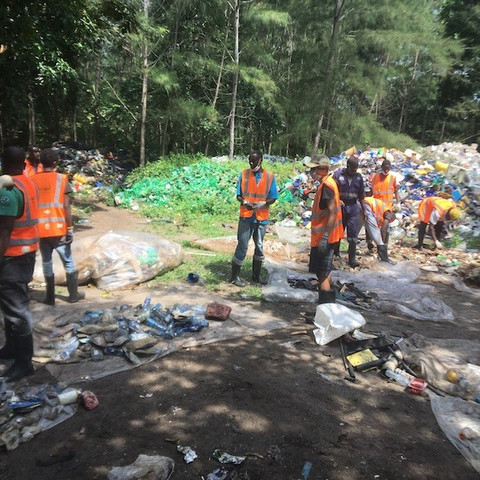And...where does all our trash go?
- Kwale Plastics
- Jul 16, 2020
- 4 min read
Over the last two months our Trash4Cash program has collected a staggering 8,674kgs of waste from the sides of the roads, roadside open dumpsites and just a small stretch of Diani Beach! The big question we’re asked is, ‘Where does it all go from there so that it doesn’t end up in a landfill?” For the T4C participants to better understand what KPPC is doing in our Diani Municipal area, we took our team to the Depot in Muhaka to see the waste they had collected and what is being done to it.
Muhaka is a few kilometres off the main Lunga Lunga road, just south of Ukunda. It’s a rural area with small communities where lower income people etch out a living from their land or ‘cottage’ enterprises. Two years ago as KPPC began, the Flipflopi team donated 2.8 acres of land in Muhaka to become the sorting and transfer site of the waste collected from KPPC’s 300km2 Pilot Area in greater Diani and Ukunda. It’s at this Depot where this waste is further sorted and prepared for repurposing and recycling. Since KPPC began in 2018 by introducing segregated waste collection bins in the pilot area, we have been bringing the disposed waste to the Depot for further sorting into specific types or fractions. Once done we’re ready to sell it to selected recyclers of metal, paper and glass waste—and we store certain plastic waste knowing we’ll one day be able to ‘close the loop’ when we build our own recycling facility. We’re even stockpiling some of the plastic that will one day be used to make the next 70-metre Flipflopi Dhow!
When you arrive at Muhaka you are struck by the large piles of plastic, tins, bottles and other waste collected over the 2+ years of KPPC operations. While it looks a bit overwhelming the first thing to realize is that if this waste was not at this depot much of it would eventually end up in the ocean, degrading the marine ecosystem and threatening the health and lives of sea creatures from fish to turtles to whales, and to many other species dependent on a healthy coral reefs, sea grass and more.
After a quick look around, the T4C got down to sorting the waste. While KPPC mostly collects segregated-at-source disposed waste from the 4 branded—Plastic, Paper, Metal and Glass – bins at each of our Green Stations, this all needs further segregating at the depot. There are several types of plastics including PET, PP, HDPE and LDPE and each needs to be repurposed differently. The same is true for Metal– from soft aluminium beer cans to paint tins to food tins and other items made of metal. All must be separated for resale or recycling. Glass needs to be separated by colour, and there’s a difference between ‘soft’ paper and cardboard, and coated paper. Once made aware of this, the T4C team got busy.
The women were put to sorting the metal tins and cans. In about 3 hours they filled two big bags with tins that had to be flattened first. They also separated out spray cans and paint tins and made piles of other metals. Once this is done a metal buyer can be contacted. All sales money goes toward paying wages and other costs to keep the waste collection and sorting processes going.
The T4C men sorted out the big bags of mixed waste that had been collected along the roadsides. This too needed to be separated into its different types – especially plastic. Paper and cardboard were added to the existing piles in readiness for onward sales for recycling.
On the morning we were at the Depot we received about 50 large bags of clear plastic bottles, which were added the appropriate stockpile. Even though such waste does not weigh a lot— only about 200 kg—it takes up space. One aim of KPPC is to reduce the amount of ‘single-use plastic’ that is generated within the tourism and hospitality sectors and in society generally. A lot of single-use plastic is from bottled water and it is noticeable at the depot how many bottles there are from the total waste collected. In a hot area like Kwale people need to drink lots of water to keep hydrated, and we certainly must find a better way to provide water so we can effectively reduce ‘single-use’ plastic water bottles! Fortunately, many hotels and resorts are no longer serving water and drinks in plastic bottles and many have discarded the practice of providing plastic straws with drinks. The recent law prohibiting the bringing of plastic onto our beaches and into national parks is a good law—as long as it is enforced and people follow it. And we all can do our part to make this happen!
All in all it was a busy and efficient morning with a lot achieved—and learned. As we enter our 2nd 6-week T4C project period, it’s very likely the T4C team will be back soon to our Depot to continue with the great job they did, in just 1 morning. Well done, Team Trash4Cash!

The end of a good day at KPPC’s Depot in Muhaka




























Comments